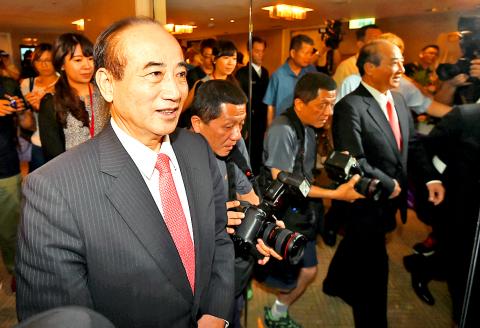A number of Chinese Nationalist Party (KMT) legislators from central and southern Taiwan yesterday expressed concern about support for Deputy Legislative Speaker Hung Hsiu-chu (洪秀柱) in January’s presidential election, despite the 46.203 percent support rate she drew in the party’s presidential primary polls.
KMT party headquarters yesterday announced that Hung passed the required 30 percent support threshold for the primary polls, qualifying her to be nominated for the January election.
KMT sources said that “hesitation and cowardice” among so-called “heavyweights” who failed to run in the primary drove party members to support Hung and help her pass the primary threshold.

Photo: Chang Chia-ming, Taipei Times
KMT Legislator Chen Ken-te (陳根德), a supporter of Legislative Yuan Speaker Wang Jin-pyng (王金平), said there was no question of Hung receiving enough support to pass the party’s internal requirements, adding that now it is up to the party’s Central Standing Committee — and how many of its members would actually respect the party’s system.
Asked if nominating Hung as its presidential candidate would affect the party’s chances of winning, Chen said he was not optimistic about the party’s chances with her as its candidate, adding that the present political environment is against the party.
Whether the party’s upper echelons and its chairman had sufficient wisdom to help the party through the difficult period was key, Chen said, adding that KMT legislators can only help by securing votes in their respective constituencies.
KMT Legislator Huang Chao-shun (黃昭順), who represents a constituency in Kaohsiung, said she was not concerned about the primaries and would respect the party’s decision.
“Nothing has gone according to predictions since the primaries began and nothing seems to be set in stone,” Huang said, adding that she wished only the best for Hung in her efforts.
However, a KMT source in central Taiwan who wished to remain anonymous said that if Hung were nominated, the January presidential and legislative elections in central and southern Taiwan would be a disaster, citing Hung’s dedication to the pan-blue ideology and to unification with China on cross-strait policies as her weak points.
Since the KMT landslide defeat in the nine-in-one elections in November last year, the Democratic Progressive Party (DPP) has gained a lot of influence nationwide and the KMT could ill afford to lose more neutral voters to the pan-green camp, the source said.
Pundits often attributed the KMT’s losses to the President Ma Ying-jeou (馬英九) administration’s China policies.
“We are helpless in the current situation and can only hope for the best,” the source said.
Wang said he congratulated Hung on her primary win.
Asked about his presidential aspirations, Wang said there was no need to speak of past comments, adding that he hoped Hung achieves her goals.
Wang last week said that he would be “duty-bound to agree” to run for president if the KMT were to “draft” him as its candidate.

A preclearance service to facilitate entry for people traveling to select airports in Japan would be available from Thursday next week to Feb. 25 at Taiwan Taoyuan International Airport, Taoyuan International Airport Corp (TIAC) said on Tuesday. The service was first made available to Taiwanese travelers throughout the winter vacation of 2024 and during the Lunar New Year holiday. In addition to flights to the Japanese cities of Hakodate, Asahikawa, Akita, Sendai, Niigata, Okayama, Takamatsu, Kumamoto and Kagoshima, the service would be available to travelers to Kobe and Oita. The service can be accessed by passengers of 15 flight routes operated by

GIVE AND TAKE: Blood demand continues to rise each year, while fewer young donors are available due to the nation’s falling birthrate, a doctor said Blood donors can redeem points earned from donations to obtain limited edition Formosan black bear travel mugs, the Kaohsiung Blood Center said yesterday, as it announced a goal of stocking 20,000 units of blood prior to the Lunar New Year. The last month of the lunar year is National Blood Donation Month, when local centers seek to stockpile blood for use during the Lunar New Year holiday. The blood demand in southern Taiwan — including Tainan and Kaohsiung, as well as Chiayi, Pingtung, Penghu and Taitung counties — is about 2,000 units per day, the center said. The donation campaign aims to boost

ENHANCING EFFICIENCY: The apron can accommodate 16 airplanes overnight at Taoyuan airport while work on the third runway continues, the transport minister said A new temporary overnight parking apron at Taiwan Taoyuan International Airport is to start operating on Friday next week to boost operational efficiency while the third runway is being constructed, the Ministry of Transportation and Communications said yesterday. The apron — one of the crucial projects in the construction of the third runway — can accommodate 16 aircraft overnight at the nation’s largest international airport, Minister of Transportation and Communications Chen Shih-kai (陳世凱) told reporters while inspecting the new facility yesterday morning. Aside from providing the airport operator with greater flexibility in aircraft parking during the third runway construction,

American climber Alex Honnold is to attempt a free climb of Taipei 101 today at 9am, with traffic closures around the skyscraper. To accommodate the climb attempt and filming, the Taipei Department of Transportation said traffic controls would be enforced around the Taipei 101 area. If weather conditions delay the climb, the restrictions would be pushed back to tomorrow. Traffic controls would be in place today from 7am to 11am around the Taipei 101 area, the department said. Songzhi Road would be fully closed in both directions between Songlian Road and Xinyi Road Sec 5, it said, adding that bidirectional traffic controls would